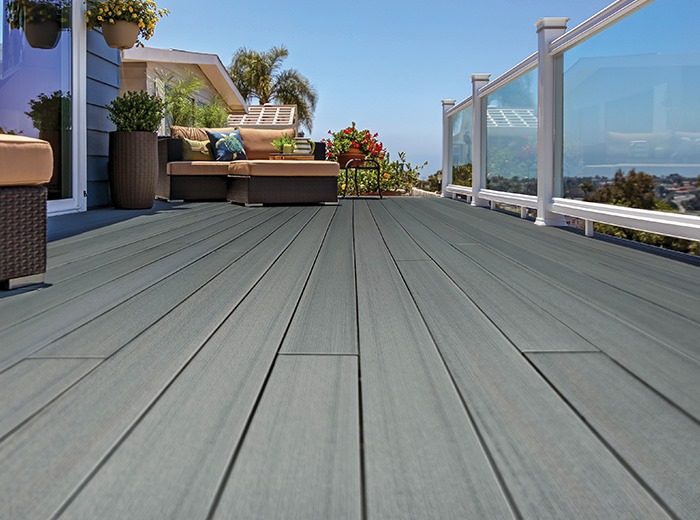
If you're looking to improve your outdoor space, then there's no better way to give your garden a new lease of life like a brand new deck! When researching options for decking materials, it can be quite overwhelming with the array of choice available on the market.
In this blog, we'll break down the differences between composite decking vs vinyl to help you make an informed decision for your outdoor renovation.
What is Vinyl Decking?
Vinyl decking, also known as PVC decking (polyvinyl chloride), is made entirely of plastic. It is an extremely versatile man-made product and can be used for many applications, including:
Many people choose to use vinyl decking as it is a durable material that's resistant to weathering. But, many people often forget the cheaper and environmentally friendly alternative - composite decking!
What's the Difference Between Composite and Vinyl Decking?
On the surface, composite decking and vinyl may seem very similar. But, there are a few key differences that may influence your decision on which decking material to use.
Strength
When you purchase a deck, it's important that you know that it's going to last. A deck is an investment, and it should stand the test of time.
Both composite decking and vinyl have better durability than wood - they are both resistant to moisture, rotting and the risk of splintering, especially in cold or damp weather.
Alternatively, in hot weather, vinyl decking may not be the best choice. As vinyl decking is made of thermoplastics, it is at risk of warping due to high temperatures.
In this scenario, composite decking is your best option. Due to its mix of wood and plastic, composite decking is much more rigid and stable than wood or vinyl decking.
Cost
Both composite and vinyl decking are more expensive than wood decking - but for good reason! They are extremely cost-efficient as they require less maintenance. There's no need to re-paint, re-seal or re-stain your decking once it's been installed.
Despite the similarities between composite and vinyl decking, you'll find that vinyl decking is slightly more expensive than composite decking. In fact, it's one of the most expensive deck materials on the market.
Appearance
Appearance can be down to personal preference, so it's important to take these points with a pinch of salt. If you can look past an overly polished and artificial appearance, then vinyl decking could be the choice for you. There's no problem with that if it is in line with your aesthetic!
If you'd like your new deck to look more natural and wood-like, composite decking is - without a doubt - the best choice. In fact, our composite decking range includes decking boards with unique grain patterns and textured surfaces for enhanced authenticity.
Whilst vinyl decking is able to imitate the natural features of wood, it will not have the same seamless appearance as composite decking.
What Are the Disadvantages of Vinyl Decking?
The disadvantages of using vinyl decking are as follows...
- It is susceptible to warping in high temperatures
- It develops a haze/chalkiness over time
- It is the most expensive decking material on the market
- It's appearance is synthetic and unnatural
- It is made of the most environmentally damaging plastic
Buy Composite Decking with DeckPlus Today!
If you have any questions about our composite decking products, installation, or how composite decking can increase the value of your property, reach out and contact us today. A member of our customer service team will be more than happy to answer any questions you may have and help you decide which composite decking product is right for you.
Contact Us
Read More:
Is Composite Decking Worth the Price?